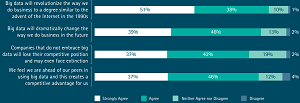News
Big Data Pays Off Big Time, Survey Says
- By David Ramel
- September 12, 2014
Organizations that have actually implemented Big Data projects report "overwhelming satisfaction" with the results and most believe the tool may be a matter of corporate life or death in the future, according to a new survey from Accenture Analytics.
The "Big Success with Big Data" report released this week also indicates the bigger the organization, the bigger the payoff, Accenture said in a summary of its survey of more than 1,000 respondents at companies that had completed at least one Big Data implementation as of last April.
The survey, spanning seven industries and companies with headquarters in 19 countries, found that 92 percent of respondents are satisfied with the business outcomes of their projects, while 94 percent believe their Big Data implementation meets their companies' needs.
"While a significant number of organizations may still be standing on the sidelines, Big Data users who start and complete projects see practical results and significant value," Accenture said. "Organizations perceive Big Data to be critical for a wide spectrum of strategic corporate goals, from new revenue generation and new market development to enhancing the customer experience and improving enterprise-wide performance."
Bigger companies seem to get the biggest benefits because they have a better understanding of the scope, value and importance of Big Data; seriously focus on useful applications and results; are more committed to the projects; and bring bigger budgets and more talent to the table, Accenture speculated.
 [Click on image for larger view.]
Big Data's competitive significance. (source: Accenture)
[Click on image for larger view.]
Big Data's competitive significance. (source: Accenture)
Looking forward, respondents see even bigger things to come.
"A vast majority of users (89 percent) believe Big Data will revolutionize business operations in the same way the Internet did," Accenture said. "Nearly as many (85 percent) feel Big Data will dramatically change the way they do business. Almost eight in 10 users (79 percent) agree that 'companies that do not embrace Big Data will lose their competitive position and may even face extinction.' Even more (83 percent) have pursued Big Data projects in order to seize a competitive edge."
Over the next five years, the main benefits expected from Big Data projects are improved customer relationships, redefined product development, better operations organization, a more data-focused business, an optimized supply chain and a fundamental change in business practices.
The concept of Big Data may be getting more nebulous these days, and nine different responses were listed by at least 25 percent of respondents asked to identify what they considered to constitute the parts of Big Data. Some of those responses included data files of 20TB or more; advanced analytics or analysis; data from visualization tools, social networks or telematics; and unstructured data such as video, open or free text, voice and log files.
Security, as usual, was listed as the No. 1 challenge to implementing Big Data projects, listed by 51 percent of respondents. Rounding out the top five obstacles were budget (47 percent); lack of talent to implement Big Data (41 percent); lack of talent to run Big Data and analytics on an ongoing basis (37 percent); and integration with existing systems (35 percent).
To benefit from Big Data, Accenture advised companies to:
- Explore the entire Big Data ecosystem. The Big Data landscape is in a constant state of flux with new data sources and emerging big data technologies. Explore all data available and be prepared to explore a broad range of technology options when developing a Big Data strategy with a focus toward business actions and outcomes that can be differentiating in the market.
- Start small then grow. Focus resources around proving value quickly in one area of the business first via a pilot program or proof of concept. Build internal consensus and then grow Big Data programs organically.
- Be nimble. Stay flexible, adapt and learn as technologies evolve and new opportunities can be explored.
- Focus on building skills. In addition to staffing up when possible, build skills of existing employees with training and development and tap outside expertise.
Note that Accenture Analytics provides consulting and outsourcing services "for clients seeking superior returns on their analytics investment."
About the Author
David Ramel is an editor and writer at Converge 360.